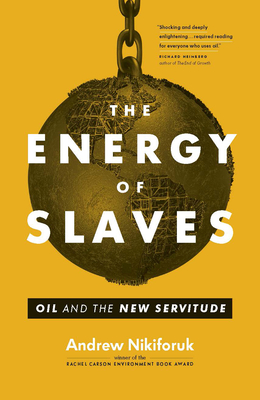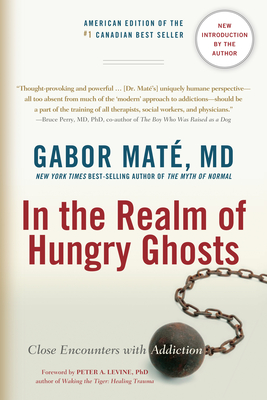Ancient civilizations relied on shackled human muscle. It took the
energy of slaves to plant crops, clothe emperors, and build cities.
Nineteenth-century slaveholders viewed critics as hostilely as oil
companies and governments now regard environmentalists. Yet the
abolition movement had an invisible ally: coal and oil. As the world's
most versatile workers, fossil fuels replenished slavery's ranks with
combustion engines and other labor-saving tools. Since then, cheap oil
has transformed politics, economics, science, agriculture, and even our
concept of happiness. Many North Americans today live as extravagantly
as Caribbean plantation owners. We feel entitled to surplus energy and
rationalize inequality, even barbarity, to get it. But endless growth is
an illusion.
What we need, Andrew Nikiforuk argues in this provocative new book, is a radical emancipation movement that ends our master-and-slave approach to energy. We must learn to use energy on a moral, just, and truly human scale.
Based on Gabor Maté’s two decades of experience as a medical doctor and his groundbreaking work with the severely addicted on Vancouver’s skid row, In the Realm of Hungry Ghosts radically reenvisions this much misunderstood field by taking a holistic approach. Dr. Maté presents addiction not as a discrete phenomenon confined to an unfortunate or weak-willed few, but as a continuum that runs throughout (and perhaps underpins) our society; not a medical "condition" distinct from the lives it affects, rather the result of a complex interplay among personal history, emotional, and neurological development, brain chemistry, and the drugs (and behaviors) of addiction. Simplifying a wide array of brain and addiction research findings from around the globe, the book avoids glib self-help remedies, instead promoting a thorough and compassionate self-understanding as the first key to healing and wellness.
In the Realm of Hungry Ghosts argues persuasively against contemporary health, social, and criminal justice policies toward addiction and those impacted by it. The mix of personal stories—including the author’s candid discussion of his own "high-status" addictive tendencies—and science with positive solutions makes the book equally useful for lay readers and professionals.
Lynn says:
"Alright. I admit it. I'm a geek in the peculiar reading genre of fossil fuels. Why? Well, because fossil fuels present an addiction like no other.... I mean, the topic easily insinuates itself into so many other fascinating subjects; economics, politics, agriculture, sustainability, travel, empire, ecology, geology, human psychology (especially addiction and denial)- not to mention spirituality and cultural anthropology or history.... the list goes on and on! Prized enough to be deemed as so essential (as the very air we breathe or the food we eat) that we fight wars to secure access to or control over fossil fuels, we live as though the oh-so-temporary energy sources that bring comfort and light into our lives were not subject to physical laws. Trouble is, they are finite.
2012 has been a great year for books on the subject; Tom Wilber's Under the Surface: Fracking, Fortunes & the Fate of the Marcellus Shale and Steve Coll's Private Empire: ExxonMobil and American Power among them. The latest one to floor me with its insights into our learned (and masterfully facilitated) helplessness is Canadian author Andrew Nikiforuk's new The Energy of Slaves: Oil and the New Servitude. After reading Nikiforuk's book on the Tar Sands in Alberta, I was eager to see what he'd come up with this time. Information dense and spellbinding in its call for an ethical approach to our energy dilemmas, Energy of Slaves pierces through to the crux of our addiction and contextualizes it historically and culturally. Which is why, I suppose, I found myself simultaneously reading Vancouver physician, Dr. Gabor Mate's (what is it with these Canadians!?) slightly older but still very incisive In the Realm of Hungry Ghosts: Close Encounters With Addiction which gives an in-depth look into addictions from heroin to alcohol to compulsive shopping on the personal level to oil on the global level, and does so with an engaging blend of neuroscience and compassion for our nature/nurture quandaries around addiction's causes, the 'war on drugs' and addiction harm-reduction.
Aside from the Canadian connection, I hadn't even noticed until nearly done with the second book that both books have a ball and chain in their cover art. Both are calls in their own ways to living within our means and backing away from the massively scaled globalized monoculture that would make of our lives a fossil-fueled machine- and, instead, moving toward the impartial observer in our minds that can free us from our personal and collective addictions with the sobriety of the 12 steps deeply contemplated. Whether prisoners to the combustion engine or to cocaine, workaholism, eating disorders, smoking or other reactive behaviors, we all have in common the aversion/attraction dualism that would require, well... a couple books, to better explain. These two, in my opinion, are real treasures as embodiments of the spirit of that first step toward recovery... you know, that one with the admission that our lives have become unmanageable due to our addiction? Anyway, I hope both books find a wide readership, as they provide useful traction to take on the other 11 steps."
What we need, Andrew Nikiforuk argues in this provocative new book, is a radical emancipation movement that ends our master-and-slave approach to energy. We must learn to use energy on a moral, just, and truly human scale.
Based on Gabor Maté’s two decades of experience as a medical doctor and his groundbreaking work with the severely addicted on Vancouver’s skid row, In the Realm of Hungry Ghosts radically reenvisions this much misunderstood field by taking a holistic approach. Dr. Maté presents addiction not as a discrete phenomenon confined to an unfortunate or weak-willed few, but as a continuum that runs throughout (and perhaps underpins) our society; not a medical "condition" distinct from the lives it affects, rather the result of a complex interplay among personal history, emotional, and neurological development, brain chemistry, and the drugs (and behaviors) of addiction. Simplifying a wide array of brain and addiction research findings from around the globe, the book avoids glib self-help remedies, instead promoting a thorough and compassionate self-understanding as the first key to healing and wellness.
In the Realm of Hungry Ghosts argues persuasively against contemporary health, social, and criminal justice policies toward addiction and those impacted by it. The mix of personal stories—including the author’s candid discussion of his own "high-status" addictive tendencies—and science with positive solutions makes the book equally useful for lay readers and professionals.
Lynn says:
"Alright. I admit it. I'm a geek in the peculiar reading genre of fossil fuels. Why? Well, because fossil fuels present an addiction like no other.... I mean, the topic easily insinuates itself into so many other fascinating subjects; economics, politics, agriculture, sustainability, travel, empire, ecology, geology, human psychology (especially addiction and denial)- not to mention spirituality and cultural anthropology or history.... the list goes on and on! Prized enough to be deemed as so essential (as the very air we breathe or the food we eat) that we fight wars to secure access to or control over fossil fuels, we live as though the oh-so-temporary energy sources that bring comfort and light into our lives were not subject to physical laws. Trouble is, they are finite.
2012 has been a great year for books on the subject; Tom Wilber's Under the Surface: Fracking, Fortunes & the Fate of the Marcellus Shale and Steve Coll's Private Empire: ExxonMobil and American Power among them. The latest one to floor me with its insights into our learned (and masterfully facilitated) helplessness is Canadian author Andrew Nikiforuk's new The Energy of Slaves: Oil and the New Servitude. After reading Nikiforuk's book on the Tar Sands in Alberta, I was eager to see what he'd come up with this time. Information dense and spellbinding in its call for an ethical approach to our energy dilemmas, Energy of Slaves pierces through to the crux of our addiction and contextualizes it historically and culturally. Which is why, I suppose, I found myself simultaneously reading Vancouver physician, Dr. Gabor Mate's (what is it with these Canadians!?) slightly older but still very incisive In the Realm of Hungry Ghosts: Close Encounters With Addiction which gives an in-depth look into addictions from heroin to alcohol to compulsive shopping on the personal level to oil on the global level, and does so with an engaging blend of neuroscience and compassion for our nature/nurture quandaries around addiction's causes, the 'war on drugs' and addiction harm-reduction.
Aside from the Canadian connection, I hadn't even noticed until nearly done with the second book that both books have a ball and chain in their cover art. Both are calls in their own ways to living within our means and backing away from the massively scaled globalized monoculture that would make of our lives a fossil-fueled machine- and, instead, moving toward the impartial observer in our minds that can free us from our personal and collective addictions with the sobriety of the 12 steps deeply contemplated. Whether prisoners to the combustion engine or to cocaine, workaholism, eating disorders, smoking or other reactive behaviors, we all have in common the aversion/attraction dualism that would require, well... a couple books, to better explain. These two, in my opinion, are real treasures as embodiments of the spirit of that first step toward recovery... you know, that one with the admission that our lives have become unmanageable due to our addiction? Anyway, I hope both books find a wide readership, as they provide useful traction to take on the other 11 steps."



No comments:
Post a Comment